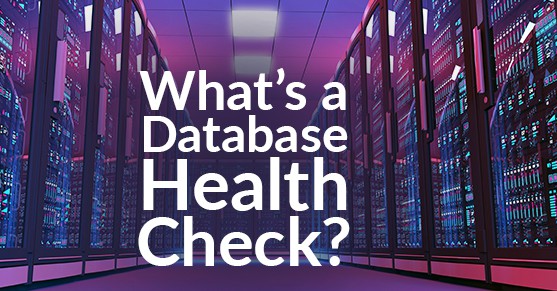As a critical component of your business, a healthy database is vital to staff efficiency and customer satisfaction. If you’ve neglected database maintenance and tuning, chances are you’re running into a litany of performance issues. When your database begins to lag, so does your business. As simple as it sounds, many companies aren’t quite sure what a health check is, when they should get one, and how to move forward afterward. Let’s answer some of these questions.
What is a Database Health Check?
As the name suggests, a health check is a database inspection to see how healthy and efficient the system is. To gain a complete understanding of the issues, a DBA will evaluate overall configuration, query performance, data safety, index efficiency, data maintenance procedures, and security. When a client comes to Virtual-DBA looking for a health check, we approach their system with a few general questions to help direct the health check.
- Are the database and operating system properly tuned?
- Are there sufficient resources (physical or virtual) for the database tasks?
- Is database engine performance tuning or query performance tuning needed?
- Have schemas been normalized or denormalized where appropriate?
- Have the proper indexes been created?
- Are critical administrative utilities run regularly?
- Is the system backed up or replicated as needed for the environment?
- Are disaster recovery (DR) procedures documented and tested?
- Does the staff have the requisite skills needed to maintain an efficient system?
As we run through our checklist, we’re able to identify what’s causing performance, stability, security, or data safety issues and provide a report documenting our findings and recommendations to address the system’s health. The health check can serve as a baseline for future system comparisons or as a template for a migration to new hardware or the cloud.
When Should We Get a Database Health Check?
Carving out time for regularly scheduled health checks can save a lot of time, but we often see clients that forego consistent health checks, resulting in several issues. If you’re experiencing any of the following, it’s time to see a professional for some tuning.
- You’re Seeing Poor Performance: This is a prominent indicator that your database needs a health check. When you start noticing things like slow returns on queries, slow applications, and crashes, it’s time to schedule a health check.
- You’re Talking About Additional Hardware: While additional hardware is sometimes necessary, it’s not always the route to take. Many companies turn to extra processors, faster storage, or another server, but they really needed a health check to highlight areas to optimize and innovate.
- Your Database Has Been Neglected: Anytime there’s an opportunity to update your system or a service pack is released, you would love to be able to take advantage of it. Test restoring from backups on a regular schedule is a challenge for some — sometimes we don’t have the staff or the knowledge in house to properly manage and care for a database environment. We don’t always know what we aren’t addressing, so a health check can help you identify areas that may be neglected and need some attention. At times, it’s just as simple as the situation where a business is set in their ways, always doing things the same way, and didn’t know there was a better option.
- You’ve Had an Outage: Even if you can pinpoint the exact cause of your outage — whether it was corrupt files, system damage, or a hardware malfunction — there might be something else lurking in the dark. Health checks will help you address the current problem, but they’ll also weed out any other potential risks.
Database Health Checks from Virtual-DBA
Although the foundation of every health check is the same, the process changes for each platform. Over the years, our versatility has allowed us to understand the ins and outs of health checks for many popular databases, including IBM Db2, Microsoft SQL Server, MySQL, Oracle, Informix, and more. To get a better understanding of our health check processes, here are some overviews of how we handle each database.
(To see the full spectrum of our health checks, performance tuning, and other DBA services, click here.)
Reach Out for a Health Check
If you’ve noticed your database performance has been slowly degrading or you have been troubleshooting some pesky issues, don’t wait for everything to come to a halt and reach out to us today! Whatever platform you’re on, we can get it back up to speed in no time.

